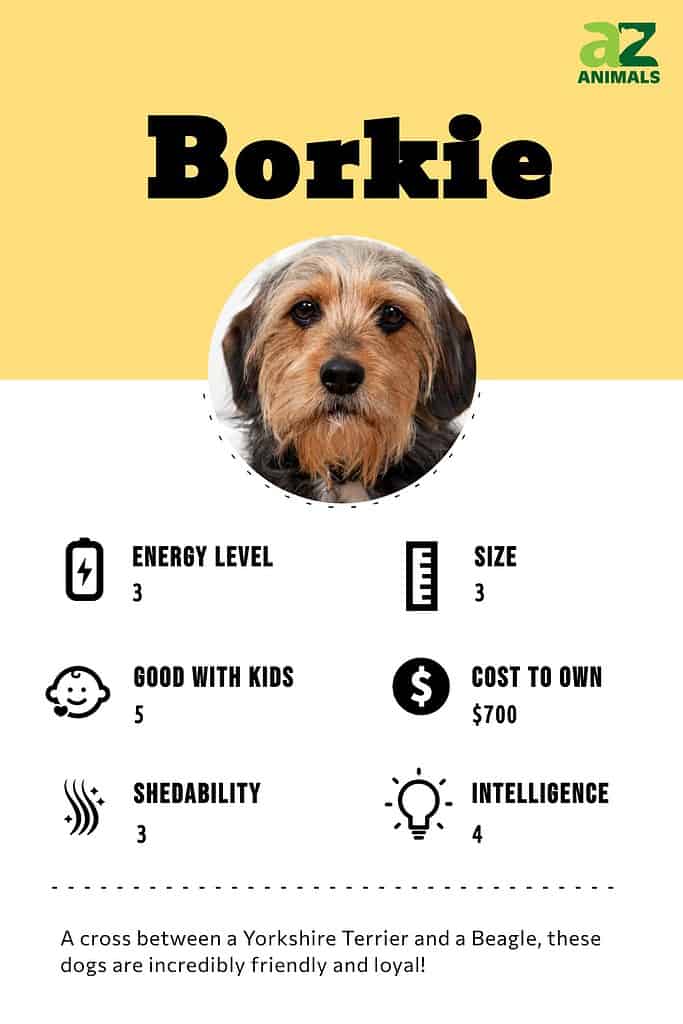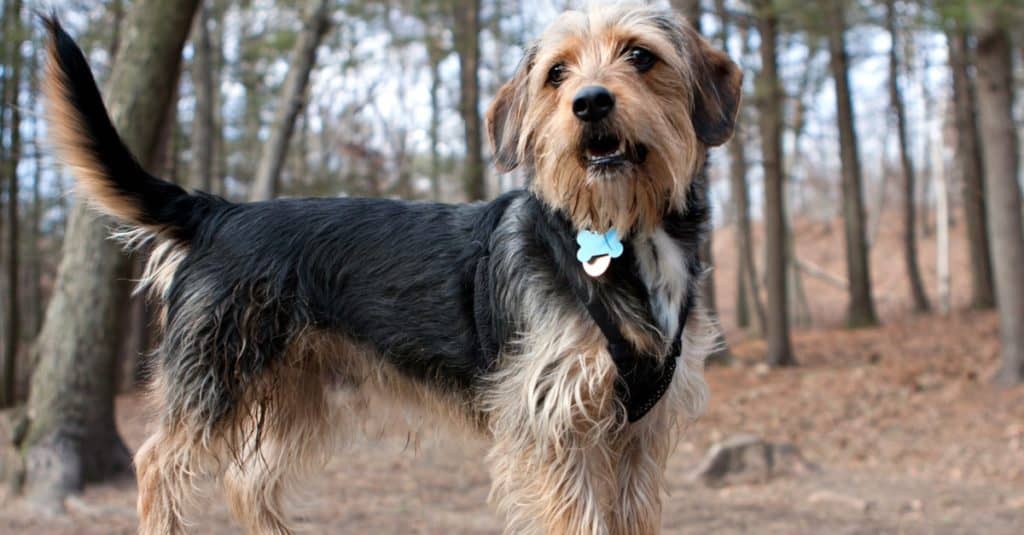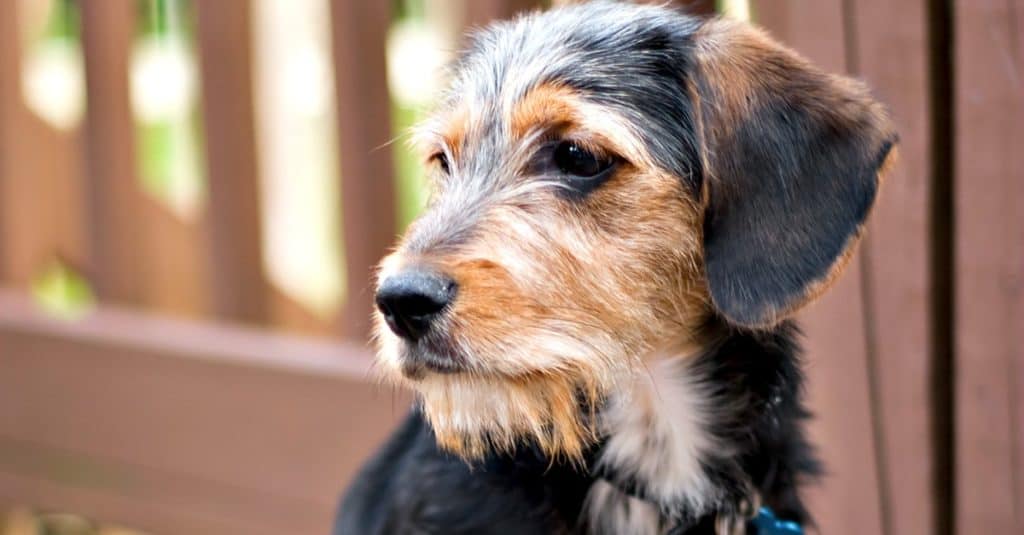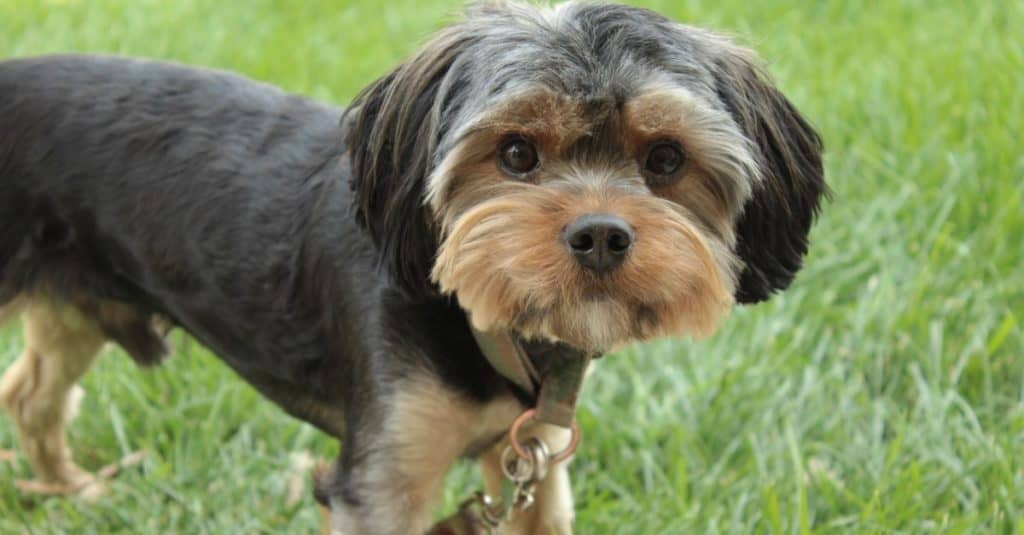Borkie
Canis lupus
Most Borkies inherit the signature howl of their Beagle parent.
Advertisement
Borkie Scientific Classification
- Kingdom
- Animalia
- Phylum
- Chordata
- Class
- Mammalia
- Order
- Carnivora
- Family
- Canidae
- Genus
- Canis
- Scientific Name
- Canis lupus
Read our Complete Guide to Classification of Animals.
Borkie Conservation Status
Borkie Facts
- Fun Fact
- Most Borkies inherit the signature howl of their Beagle parent.
- Temperament
- Lovable and energetic
- Diet
- Omnivore
Borkie as a Pet:
- General Health
- Energy Level
- Shedability
- Trainability
- Intelligence
- Tendency to Chew
- Size
- Family and kid friendliness
- Yappiness / Barking
- Moderate
- Separation Anxiety
- High
- Preferred Temperature
- Average climate
- Exercise Needs
- Moderate
- Friendly With Other Dogs
- High
- Pure bred cost to own
- $700
- Dog group
- Non-sporting
- Male weight
- 20-25 lbs
- Female weight
- 20-25 lbs
This post may contain affiliate links to our partners like Chewy, Amazon, and others. Purchasing through these helps us further the A-Z Animals mission to educate about the world's species.
View all of the Borkie images!
A Borkie’s howl is similar to its Beagle parent.

Breed a Beagle with a Yorkshire Terrier and you get a Borkie! Like many other ‘designer dogs’ Borkies date back to the 1990s. ‘Designer dogs’ are the result of breeding two purebred canines to get a puppy that possesses the best qualities of each parent.
See all of our expert product reviews.
A Borkie’s coat is silky like a Yorkshire Terrier’s, but the dog has a body structure similar to a Beagle. Plus, a Borkie usually has a tri-color (black, brown, and white) coat like a Beagle’s. They are intelligent, energetic, and very protective of their family. These canines do well in families with children and other pets. They have a distinctive howl that reminds many owners of a Beagle. No surprise there!
3 Pros and Cons of Owning a Borkie
| Pros! | Cons! |
|---|---|
| Good with children Borkies are even-tempered and get along well with children. | Needs regular grooming This dog needs to be brushed every day to keep its coat free of tangles and mats. It also needs to be trimmed by a dog groomer every few months. |
| Easy to train This crossbreed is intelligent like its parents making it easy to obedience train. | Daily exercise Borkies need at least 30 minutes of exercise each day to stay healthy. |
| Apartment-friendly A Borkie is small so it’s a suitable pet for someone who lives in an apartment. As long as this dog receives exercise every day, it’s adaptable to a smaller living space. | Howling activity A Borkie has a howl that’s very similar to its Beagle parent. However, training can help to decrease inappropriate barking and howling activity. |
Size and Weight
Male and female Borkies can reach a height of 15 inches tall from the bottom of their feet to the top of their head. Furthermore, both males and females can weigh as much as 25 pounds. A 9-week-old Borkie weighs around 5 pounds. These dogs are considered fully grown at around 15 months old.
| Height (Male) | 15 inches |
| Height (Female) | 15 inches |
| Weight (Male) | 25 pounds, full-grown |
| Weight (Female) | 25 pounds, full-grown |
Origin
The borkie is a relatively new breed of dog, originating during the “designer dog” trend of the 1990s when many mixed breeds became en vogue. This dog’s parent breeds, the beagle and Yorkie, have long celebrated histories of their own. Both hail from England, with the Yorkshire terrier being bred initially as pest control for mines, mills, and other business plagues by rodents, and the beagle being used for foxhunting. Beagles were not immediately popular when first introduced, but rose to prominence after first being imported to America in the 1800s.
Common Health Issues

It is important to always keep an eye on your Borkie when taking them for a walk, as dislocated kneecaps are common in this breed.
©ARENA Creative/Shutterstock.com
Health and Entertainment for your Borkie
See all of our expert product reviews.
All dogs have some common health issues related to their breed, and Borkies are no exception. One common health issue of this crossbreed is epilepsy. Epilepsy is a neurological disorder that causes different types of seizures. Fortunately, there are medications available today that can control epileptic seizures in dogs.
Patellar luxation is another common health issue. In short, this is a dislocated kneecap. This condition may occur suddenly as a Borkie is running. It may start to limp or move its leg in an awkward way. Physical therapy is one treatment for patellar luxation. Surgery is sometimes necessary depending on the severity of the condition.
Dry eye, also known as keratoconjunctivitis, is another possible health issue for Borkies. This condition occurs when the tear ducts in a dog’s eyes are no longer creating enough liquid. A dog with this issue may paw at their eyes or squint. Dry eyes can lead to painful infections because bacteria isn’t being naturally washed away. Fortunately, a veterinarian can prescribe ointment an owner can apply to a Borkie’s eyes to help them stay moist.
The most common health issues that affect Borkies include:
- Epilepsy
- Patellar luxation
- Dry eye
Temperament and Behavior

Borkies are an especially active breed of dog.
©ARENA Creative/Shutterstock.com
Borkies are known for their playful, energetic behavior. They love to run around with kids and adults playing chase or fetch. One of the most memorable traits of this dog is its loyalty. Borkies want to be with their family members whether they are working in the garden or sitting on the sofa watching a movie.
Their affectionate, friendly behavior makes this dog a good option for families with young and older children. Not surprisingly, Borkies are beloved pets in many households.
How to Take Care of a Borkie

There are many factors to keep in mind when taking care of a Borkie.
©ARENA Creative/Shutterstock.com
Learning all about the healthcare, grooming, exercise, and dietary needs of a Borkie can help an owner care for their new pet. Of course, a Borkie puppy and an adult dog need different types of care. Look at some considerations for a Borkie owner.
The Best Dog Food for Borkies
Borkie puppies and Borkie adult dogs have different dietary needs. A well-planned diet can help a Borkie stay healthy and possibly avoid health issues that are common to this hybrid.
Given this breed’s health needs, A-Z Animals’ recommendation for the best Borkie dog food is Merrick Lil Plates Small Breed Dry Dog Food with Real Meat.
Firstly, we love the glucosamine and chondroitin, which are vet-approved to help keep dogs’ joints moving pain-free, which is great for dogs like Borkies that can suffer from patellar luxation. The eggs and real meat are excellent sources of taurine as well, important for the heart, eyes, and vision. Beyond that, this recipe has everything healthy Borkies need for a properly functioning nervous system, including manganese, thiamine, and pyridoxine, plus probiotics for a happy tummy.
Check Chewy or Amazon for this product.
- Real lamb and brown rice small dog breed recipe
- Glucosamine and chondroitin for healthy hips and joints
- Probiotics and prebiotic fiber supports healthy digestion
Borkie puppy food: DHA in the form of fish oil, provides support for healthy brain and eye development. DHA can help to fend off dry eye in this hybrid. Protein in this puppy’s food supports muscle, cartilage, joint, and tendon development. Fat in the diet provides nutrients for a healthy coat and skin. Vitamins E and C support the development of a healthy immune system. Calcium contributes to healthy bones and teeth.
Borkie adult dog food: Omega 6 fatty acids in an adult Borkie’s diet provides support for healthy skin and a beautiful coat. Lean protein helps to build muscle in this active pooch. Calcium builds strong bones, teeth, and nails. Calcium can also help in the fight against the development of patellar luxation. A limited amount of fat in an adult Borkie’s diet provides energy while not adding excess pounds to its small frame.
Both Borkie puppies and adult dogs need access to fresh water every day. Fresh water not only hydrates a dog, but it also helps with proper digestion.
Maintenance and Grooming

Borkies require regular brushing in order to maintain a healthy coat.
©ARENA Creative/Shutterstock.com
It’s quite common to see a breeder advertise their Borkie puppies as hypoallergenic. However, these dogs do shed a small amount of hair. It really depends on whether this hybrid dog gets most of its traits from its Beagle parent or its Yorkshire Terrier parent. If a Borkie’s coat is more like a Yorkshire Terrier’s, then it will shed a small amount of hair. Alternatively, if a Borkie’s coat is similar to its Beagle parent, then it will shed a little bit more.
Borkies need to be brushed daily to keep their silky coat free of tangles and looking shiny. A gentle slicker brush is a useful tool for grooming a Borkie. This brush removes tangles and mats from the dog’s coat without scraping against the skin. A small brush with boar’s hair bristles can be used to stir up the natural oils in this dog’s coat and make the hair shine! Start at the dog’s head and gently move the brush with the natural flow of its hair toward its tail.
Most Borkies need their coat trimmed every couple of months to keep their hair looking neat. This is especially important for the hair around a Borkie’s eyes. It can grow very long and fall into the dog’s eyes. As a note, unless an owner is skilled at trimming dogs, it’s best to take a Borkie to a reputable groomer.
These dogs can develop environmental allergies. This could be an allergy to pollen, dust, or even vegetation growing in the area. Environmental allergies can show up in the form of redness or dry skin. A dog may even scratch so much it creates a bald spot in its coat. A veterinarian can help to determine what is causing the allergies and offer guidance to the owner regarding treatment.
Training
Like its Beagle and Yorkshire Terrier parents, a Borkie is an intelligent canine. This makes obedience training fairly easy. Because these dogs become distracted or bored quickly, it’s a smart idea to limit training sessions to about 15 or 20 minutes. Of course, using a preferred treat during obedience training can help a Borkie to absorb its lessons.
A Norwich terrier is an example of another dog that’s intelligent and easily trainable.
Exercise
Borkies need a minimum of 30 minutes of exercise each day. A walk through the neighborhood, a visit to the dog park, or a game of chase in the backyard are all excellent forms of exercise for this small dog. A trip to a local park to take a walk on a trail would be a treat for this dog. After all, they are related to Beagles and would enjoy taking in all of the scents in the woods! Getting enough exercise each day can extend this dog’s lifespan past 13 years.
This canine is suitable for apartment life. It’s a small dog and would adapt to this type of environment.
Puppies
Borkie puppies are small and curious. Owners need to ensure they have a safe place where they can explore without getting into dangerous situations. A fenced-in backyard is perfect for these active puppies.
Borkies and Children
Borkies interact well with children. This dog is affectionate and protective. They love to run, jump, and play with family members!
Similar Breeds

The Yorkie poo is a great alternative for those considering adopting a borkie.
©Melli ah/Shutterstock.com
Dogs that are similar to Borkies include Yorkie Poos, Cairn Terriers, and Norwich Terriers.
- Yorkie Poos – Both this crossbreed and Borkies are energetic, affectionate dogs. They both have coats that can be a combination of black, brown, and white. But Yorkie Poos are smaller than Borkies.
- Cairn Terriers – Cairn Terriers and Borkies are both smart and lively. However, Cairn Terriers are known to have a stubborn streak.
- Norwich Terriers – Norwich Terriers and Borkies are loyal and have about the same lifespan. But, in terms of size, Norwich Terriers weigh less than Borkies.
Popular Names
Some popular names for Borkies are:
- Bud
- Missy
- Nacho
- Archie
- Pip
- Bella
- Banjo
- Fizz
Borkie FAQs (Frequently Asked Questions)
What is a Borkie?
A Borkie is a hybrid result of breeding a Beagle with a Yorkshire Terrier. It’s a small dog known for its loyalty, intelligence and affectionate nature.
Though their coat is silky like a Yorkshire Terrier’s, it is usually tricolor like a Beagle’s. Beagles are normally brown, white, and black. A Borkie may be mostly brown and black with a splash of white on its chest.
How much does a Borkie cost to own?
The price for a Borkie is around $700. Of course, one breeder may charge more or less than another for various reasons.
The yearly cost for veterinary services ranges from $300 to $500.
The monthly food budget for a Borkie is between $25 and $50. The price for food varies with the brand and amount purchased.
Are Borkies good with kids?
Yes. These dogs are good with children.
How long does a Borkie live?
A Borkie’s lifespan is 10 to 13 years.
Are Borkies hypoallergenic?
No. This dog sheds a small amount of hair but is not strictly hypoallergenic.
How much do Borkies cost?
The price for a Borkie is around $700 from a breeder. Someone who is interested in getting a Borkie may want to check their local animal shelter. Sometimes hybrid dogs like Borkies are available for adoption. The cost to adopt a Borkie would certainly be less than the price paid at a breeder.
Thank you for reading! Have some feedback for us? Contact the AZ Animals editorial team.
Sources
- VCA Hopitals, Available here: https://vcahospitals.com/know-your-pet/luxating-patella-in-dogs
- Doggy Saurus, Available here: https://doggysaurus.com/why-do-beagles-howl/


















